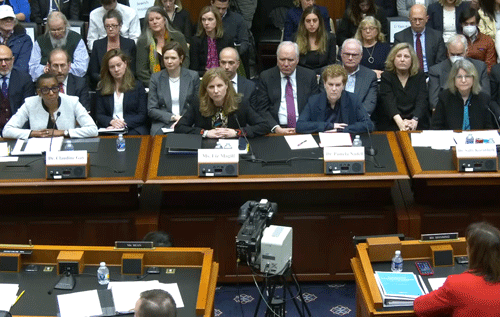When good evidence comes from bad people
Yes, it’s dirty when anonymous partisans leak damaging information to the press, but that doesn’t mean the press should ignore such information.
By Jeffrey Cole
Getting your opponent canceled has become one of the fastest growing sports in America. If you can uncover some past indiscretion or just a simple (and frequently ancient) misstatement (now that off the record no longer exists), you can eliminate a person you dislike from a cultural conversation.

Claudine Gay (left), Elizabeth Magill (center), and Sally Kornbluth (right) at a Congressional hearing on antisemitism, December 5, 2023.
So much for freedom of speech.
Does it matter who is doing the uncovering? If an opponent comes forth with accurate information—even if he or she has little regard for free speech and is exposing someone for purely partisan or, even worse, personal jealousy or petty reasons—does anything else matter?
What if the information emerges anonymously and cannot be linked to a source, so we can only suspect ill intent? Does that matter? Once reporters have thoroughly vetted the information and can attest to its veracity, do we even have to consider motive?
When I taught media ethics, this was one of our first topics: the moral quandaries that reporters and editors had to face. Although the decision about what to do with information is often not complicated, the path to that decision can be painful and traumatic.
In the last month, we have seen two good examples of accurate information coming from bad places for tainted reasons.
Claudine Gay, Harvard University president
How you felt about Gay being appointed President of Harvard University in December of 2022 probably depends on your views of Diversity, Equity, and Inclusion (DEI). Some saw her appointment as Harvard’s first Black (and second woman) president as long overdue and a triumph of policies they have supported since at least the 1970s. Other saw the promotion of a candidate with a thin resume and little experience to run America’s best known university as a lowering of standards.
Ugly information comes from ex-spouses, jealous relatives, co-workers hoping to advance through a sudden vacancy, or a political rival looking for an opening. Often the motive for providing information is nothing more than revenge. Sometimes it’s financial. No journalist wants to serve as a vehicle for helping an unsavory person get revenge. But the higher commitment is to the truth. If the motives are known to be partisan, ugly, or petty, the standards for verification must be even higher.
From the moment Gay took office in July of 2023, she was a lightning rod for attention, positive on the left and negative on the right. Gay’s failure to confront antisemitism on Harvard’s campus after the October 7 Hamas attack on Israel prompted Congress to summon her and two of her peers: Liz Magill of the University of Pennsylvania and Sally Kornbluth, President of MIT.
Under intense questioning from Representative Elise Stefanik (R-NY), a moderate turned fervent Trump supporter and a graduate of Harvard, all three university presidents answered in highly rehearsed legalese. None of them could understand the compelling need to speak with moral clarity. In that, all three failed.
Within days, Magill of Penn resigned. Stefanik responded, “one down, two to go.” It was clear this was both personal and political. Gay and Kornbluth were determined to hang on.
Then it came out that Harvard had been supplied with information showing Gay had plagiarized at least a few citations in her published articles. Harvard quickly announced that it had investigated and found that the mistakes were minor and of no consequence. Gay was cleared. Typically, plagiarism investigations take six weeks or more.
Soon, many more charges of plagiarism appeared—including an accusation that Gay had lifted someone else’s material in the acknowledgments section of her dissertation.
The radical right not only saw the opportunity to bring down Gay but also to weaken Harvard, which they view as the capital of woke progressivism. Christopher F. Rufo, a conservative activist and fellow at the Manhattan Institute for Policy Research, led the two-pronged offense.
It was clear that the right cared little about minor (but symbolic—especially for a Harvard President) charges of plagiarism. They were on a fishing expedition as part of its vendetta against Gay and Harvard. Had the accused plagiarist been a political conservative, Rufo and his allies would never have pursued the matter.
Somebody had placed information in the public arena for partisan and personal reasons to destroy Gay and weaken Harvard. Did it matter where the information came from and the motivations of the leakers?
Not in the end.
The number one obligation of news organizations is to make sure that what they share is true. They must go through a long and complicated vetting process. If the material is anonymous, or comes from a prejudiced source, it may never make it through that process.
In 1998, Newsweek’s Michael Isikoff was ready to break the story about the relationship between President Clinton and Monica Lewinsky. Because the story could lead to the downfall of a president (it did lead to impeachment), Newsweek took a long time vetting it, demanding more and more checking and proof. It took so long that blogger Matt Drudge, caring little about professional standards, learned about Isikoff’s story and printed it before Newsweek could. That is the price that responsible journalism must occasionally pay for holding truth and validation as an inviolable standard.
In an ideal world, angels hovering overhead slowly lower information into a journalist’s hands. The information is beautifully written, clear, provable, and only serves the needs of truth. Maybe this works in a Frank Capra movie, but in the real world it never happens this way.
Ugly information comes from ex-spouses, jealous relatives, co-workers hoping to advance through a sudden vacancy, or a political rival looking for an opening. Often the motive for providing information is nothing more than revenge. Sometimes it’s financial.
No journalist wants to serve as a vehicle for helping an unsavory person get revenge. But the higher commitment is to the truth. If the motives are known to be partisan, ugly, or petty, the standards for verification must be even higher.
If news organizations only ran with information supplied by nice people for patriotic purposes, a lot of bad people would remain in positions of power. Sometimes information is made available that came from blackmail or the commission of a crime (burglary or in some rare cases, murder). The same standard of truth—but with an even higher level of vetting—prevails.
It doesn’t matter why the information against Claudine Gay appeared. We should presume that it came from a rival or enemy. Nevertheless, the university needed to investigate and verify the charges of plagiarism, which it did. At that point, the main significance of the story should have been that the President of Harvard committed offenses that would have gotten her undergraduates expelled.
If the press knows that leaked information came from a partisan or jealous source, that needs to be part of the story.
Fani Willis, Fulton County, GA, District Attorney
Two weeks ago, it became known that Fanni Willis, the lead prosecutor in the Trump elections case in Georgia was having an inappropriate relationship with a prosecutor she had appointed, which is a serious conflict of interest. The information came from Michael Roman, a republican campaign operative and former investigator for the Koch Brothers. Roman is a well-known partisan.
It doesn’t matter. The evidence against Willis and her prosecutor, Nathan Wade, is now well established. The fact that it serves Roman’s goal of weakening the case and damaging Willis does not negate its importance or relevance. The motivations take a back seat to the truth.
This is the painful reality of journalism. One does not only serve angels and those in the choir. It means reporters getting their hands dirty, dealing with slime and ne’er do wells. When done right, quality journalism brings important information to the public. It can change the world and save lives.
____________

Jeffrey Cole is the founder and director of The Center for the Digital Future at USC Annenberg.
See all columns from the center.
February 7, 2024

